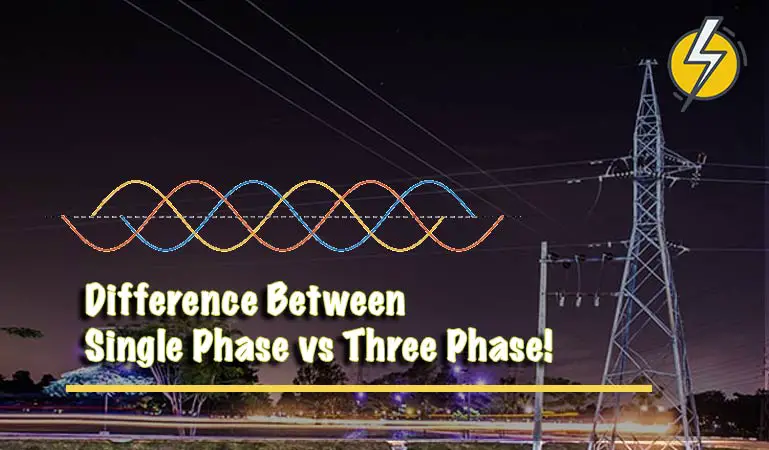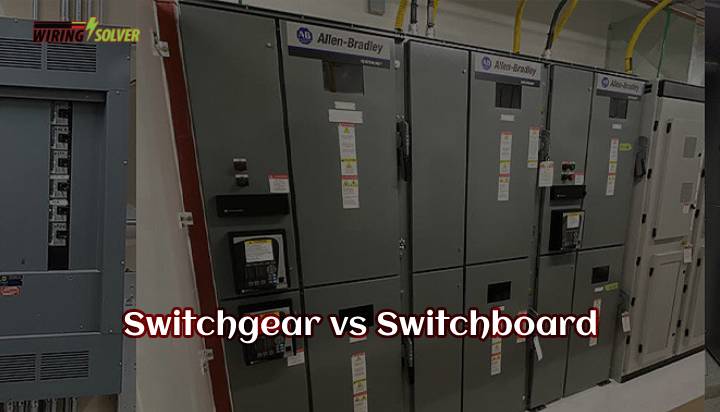There may not always be an outlet present near your desired location. In such a scenario, can you plug an AC into an extension cord?
Although the short answer is yes, there are a few factors to keep in mind. You must take into account the current carrying capability, the length, and the gauge of the extension cord. Otherwise, it may affect the AC unit and even cause electrical fires. Hence these factors must be delicately calculated.
Throughout this article, the topics will go over the detailed factors for choosing the appropriate extension cord.
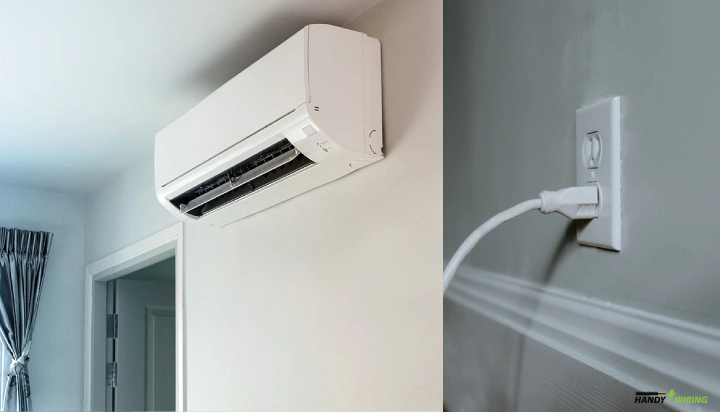
How to Choose an Extension Cord Suitable for Use with an Air Conditioner?
To select the correct extension cord for your AC you have to choose one which can carry heavy-duty current. You may notice the wires that are used for heavy-duty machines like AC or freezer is comparatively thicker than other wires in your house.
Since AC uses a lot of power. For example, a 2 Ton AC can consume about 1875 Watts of power. So it will take about 15 amperes. To carry this amount of current we need a high-capacity cord.
In such a case, we will need an extension cord with a low Gauge value. Since a lower gauge numbered cord can carry more current and have more wattage. I am going to discuss these terms in the next two articles to give you a broader aspect.
Although extension cords help to connect devices that are at a distance from the outlet, they must always be used with caution.
What Are the Factors to Choose the Correct Extension Cord?
Extension cords are classified by their capacity based on various factors. The factors that define the capacity are-
Voltage
The flow of the current depends on the voltage. Without proper voltage, there will be no current flow in the circuit. But the extension cord has to be rated in accordance with the voltage rating of the air conditioner.
Amperage
Amperage is another important factor when considering an extension cord. It is advised to select an extension cord with at least twice the amperage rating of the air conditioner that you wish to operate.
Wattage
Wattage is the power. It is the product of voltage and current. Not every extension cord can handle the same amount of electrical wattage. Hence, the capacities must be double-checked.
Length
The maximum cord length for an AC unit is 10 feet for 120V and 6 feet for 240V. AC units use short, thick power cables because longer cords result in more resistance. Hence, you should choose an extension cable that is as short as possible.
Gauge
Gauge is a kind of rating that is based on AWG (American Wire Gauge). It is expressed in numbers. Extension cords are found in the market in various gauge values.
The characteristic of the gauge is that with the increase of gauge number the cord becomes thin and can carry less current. So for heavy-duty works such as an air conditioner, you need cords with lower gauge value.
The table below shows the characteristic differences between various types of gauges.
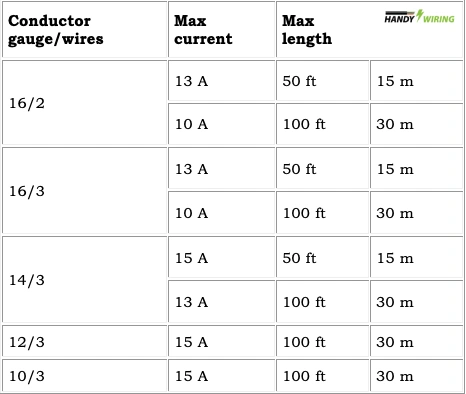
How to Determine the Appropriate Gauge and Cord Length for My Air Conditioner?
Wire Gauge
To determine the correct gauge of your extension cord you need to know the capacity of your AC. Air Conditioners use certain units like Ton. Let’s see different AC according to their capacity:
1-ton AC has a capacity of about 1 KW or 1000 Watts. It draws a current of about 8 Amps.
1.5-ton AC has a capacity of about 1400 Watts. It draws 12 Amps
2-ton AC has a capacity of about 1800 Watts. It draws 15 Amps
Here, the capacities may vary from AC to AC. It is a generalized value. You should check the labels of AC to know the exact capacity.
Now, that you know the current rating of your AC. Select the right gauge using the data. The current capacity of the AC should not exceed the capacity of your extension cord.
If you have a 2-ton AC you must choose a 12-gauge or 14-gauge wire and cord.
Length of the Cord
Regarding the length, you must keep the length as low as possible. For example, if you can get your work done with 10 feet extension cord; do not go for 50 feet.
The reason is that, when the cord is too long, it may result in a voltage fall at the consumption end.
Necessary Precautions when Operating an Air Conditioner with an Extension Cord
As an air conditioner is usually a very high power-consuming device, any small malfunctions may result in a serious electrical hazard. Ranging from electrical fires to electrocution.
Hence it is necessary to take some compulsory precautions. Let’s take a look at some of these precautionary actions.
- You must make sure that the extension cord complies with the specific air conditioner you choose to operate with it. Otherwise, it may lead to overheating or other malfunctions.
- You must examine the entire length of the cord to make sure that it has no wear or tear. Damaged electrical wires or cords can lead to electrical hazards.
- Overheating is another factor to keep track of. While it is normal for the extension cord to get slightly warm. But if it feels unusually hot, cut off the power supply at once and check for damage.
- It is advised to use a dedicated extension cord for the air conditioner. Meaning that you should refrain from plugging other appliances into the same extension cord.
- Use extension cords with three prongs. An extension cord with three prongs means that it is grounded. In the event of a malfunction, you can trust them to send the excess current to the ground. Hence, three-pronged extension cords are advised.
- Do not overload the extension cord. As it could lead to the overheating of the extension cord. And if it is overloaded for a prolonged period, it may result in a short, or even an electrical fire.
Conclusion
So, can you plug an AC into an extension cord? I believe this article tackles all of the common topics regarding this matter.
As long as you follow the instructions provided above, and refrain from creating any hazardous situations, you should be able to use a suitable extension cord with your air conditioner.
In case you want to double-check your decision, feel free to consult a professional if there is any confusion.

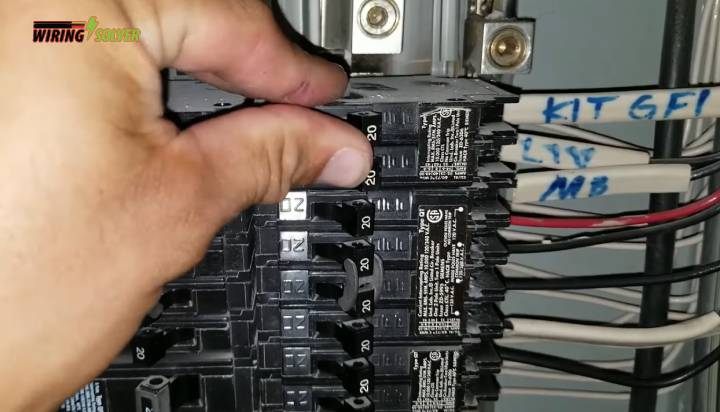
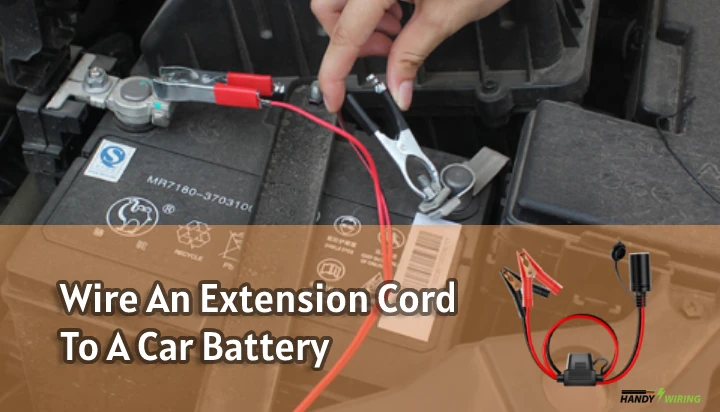
![Eaton 4-Way Switch Wiring With Diagram [Complete Guide]](https://wiringsolver.com/wp-content/uploads/2022/10/Wiring-Diagram-with-Instructions-for-an-Eaton-4-Way-Switch.jpg)
